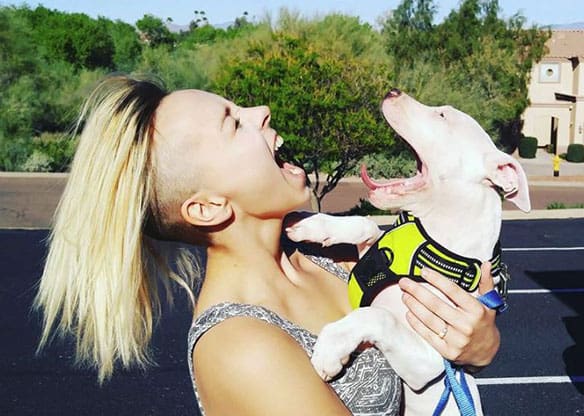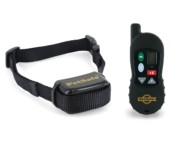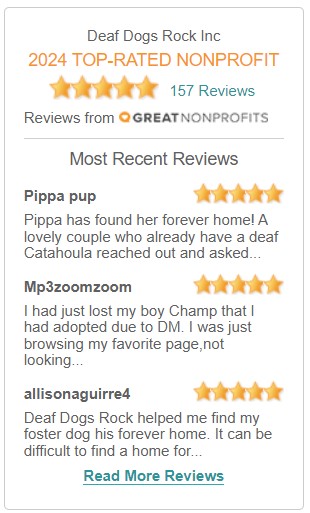Last week was a tough week here on Bluebird Farm because our smallest dog Tallulah caught a terrible cold that turned into raging sneezing and coughing attacks. I have to admit I was pretty freaked out and I didn’t get much sleep. I did get her to the Vet right away so we caught it early. My Vet Dr. Honeycutt put little Tallulah on Chlorpheniramine 4mg and it knocked the coughing and sneezing out within about two days. I started wondering if a good number of our readers even realize our Canines can catch a winter cough and cold. Here is a good article by Dr. Greg Perrault Veterinary Columnist from the Long Beach Gazettes.com discussing the effects of canine coughs and colds.
 (Photo By: Christina Lee – Tallulah)
(Photo By: Christina Lee – Tallulah)
DOGS & CATS: Canines Can Catch Winter Cough – By Greg Perrault – Veterinary Columnist – Gazettes.com
This time of year, we see a lot of dogs with coughs. Just like people, the changing seasons, travelling and stress can lower the immune system and open your pet to infections, especially respiratory disease.
Most dog owners have heard the term Kennel Cough for a hacking cough. That term is being replaced by a new term called Canine Infectious Respiratory Disease or CIRD. We now know that many different organisms and environmental factors can cause CIRD, ranging in severity from mild to fatal.
CIRD occurs because bacteria and viruses colonize the lining of the nose, larynx, trachea and lower airways, as well as the lungs. When only one bacterium or virus is involved, disease symptoms are usually mild; but when several infectious agents are present, the disease can be much worse.
The most common viruses in CIRD are canine parainfluenza virus, canine adenovirus and canine influenza. The most common bacteria by far are Bordetella bronchiseptica. Other bacteria can invade the lungs after Bordetella bronchiseptica, including Mycoplasma, Klebsiella sp., Pasteurella spp., Streptococcus equi zooepidemicus and E. coli. Several of the pathogens listed above will not usually cause disease on their own but are dependent on other factors.
If you have children, Bordetella may sound familiar to you. Bordetella Pertussis causes whooping cough in children. Bordetella bronchiseptica is a closely related germ but rarely impacts humans.
Bordetella bronchiseptica can produce exotoxins and endotoxins that can kill the lining cells of the airways and cause fever. Mycoplasma causes pneumonia in the lungs as well as attacking the cilia in the airways. This organism can cause chronic persistent coughs in dogs with chronic bronchitis as well as CIRD. Streptococcus spp. and Pasteurella spp can cause pneumonia and sepsis and death.
Canine parainfluenza virus and canine adenovirus have been known to cause mild respiratory disease. Canine influenza is a newer virus first recognized in greyhounds in 2004. A vaccine is available for canine influenza. Clinical signs can vary widely with this virus. Most dogs have cough, fever and nasal discharge lasting four to five days that seems worse than “traditional” kennel cough. A few dogs can develop hemorrhagic pneumonia and die within days. Clinical signs may appear mild at first, with coughing episodes that may be associated with attempts to vomit.
In the early stages the puppy or dog appears to be otherwise healthy. Most dogs will not advance into the more severe form. However, young puppies and older dogs may move quickly into the more severe syndrome. These dogs will have fevers, be lethargic, have difficulty breathing and will refuse to eat. CIRD can appear very similar to canine distemper because of the thick yellow-green discharge that may occur from the nose and eyes.
Your veterinarian may recommend testing to identify the particular disease. These tests include PCR testing to look for the DNA of the germ, cultures, antibody titers and x-rays.
Some coughs can resolve spontaneously in healthy, well-vaccinated individuals. However, your veterinarian may decide that your dog will benefit from a course of treatment. Treatment may be very simple if the signs are mild but can include hospitalization, i.v. antibiotics, fluids and oxygen support if the disease worsens.
Many of the germs that cause CIRD are highly contagious to other dogs, so don’t take your pet out in public or to daycare until your veterinarian says it is okay.
Vaccines are available for many of the germs that cause CIRD. Unfortunately CIRD is not entirely vaccine preventable. Some vaccines only provide partial protection, and for some of the germs there is no vaccine available. However, vaccines are still the best way to prevent CIRD. A vaccinated dog may acquire the disease and develop a cough, but will often have a much more mild and shorter case.
Keeping your dog on a good diet, well exercised and in good weight will help prevent many illnesses. Also, if you have to turn on the heat this winter, consider using a humidifier in your house to keep up the defenses in your dog’s respiratory system. Dry air can be unfriendly to the mucous membranes in your dog and pave the way for CIRD.
I hope you and your pet have a wonderful holiday season.
Dr. Greg Perrault owns and operates Cats & Dogs Animal Hospital in Long Beach, CA






